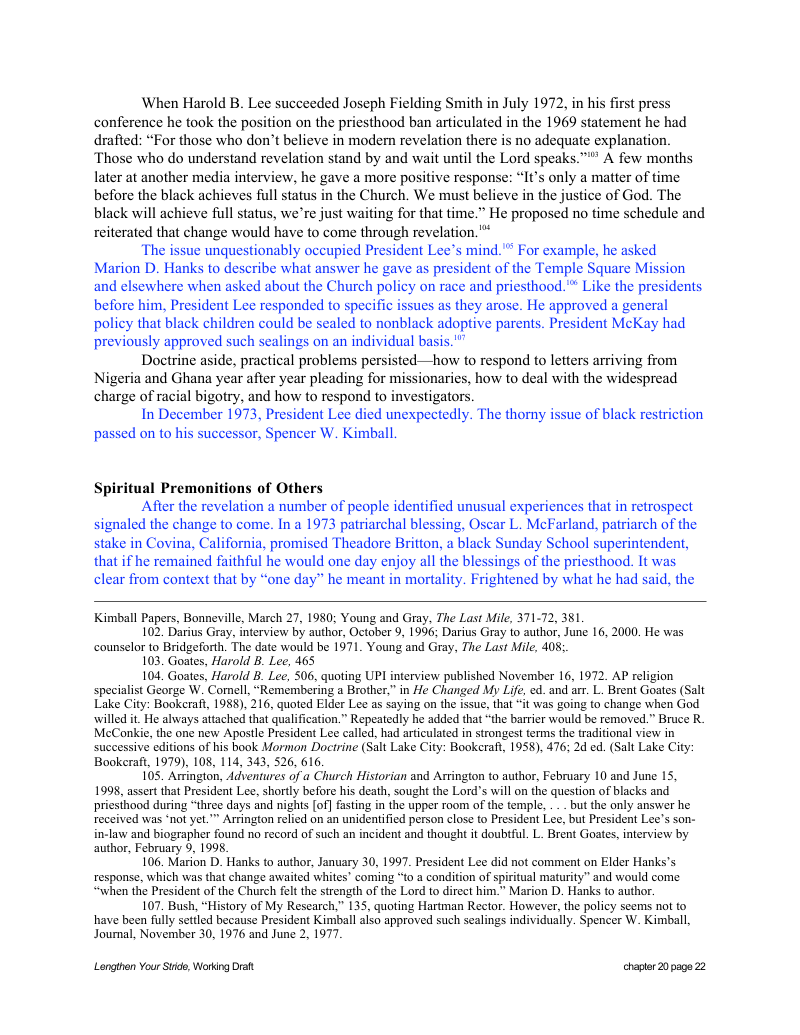Edward L. Kimball reports several individuals who had spiritual premonitions about the lifting of the priesthood ban.
- Type
- Book
- Hearsay
- DirectSecondary
- Reference
Edward L. Kimball, Lengthen Your Stride: The Presidency of Spencer W. Kimball (Salt Lake City, UT: Deseret Book, 2005), 22–24, working draft provided on digital media
- Scribe/Publisher
- Deseret Book
- People
- Joseph Freeman, Spencer W. Kimball, Alonzo Harris, Oscar L. McFarland, Theadore Britton, Rudá Martins, Helvécio Martins, Mary Frances Sturlaugson, Fugio Abe, Alexander Freeman, Bruce R. McConkie, Edward L. Kimball, F. Briton McConkie, Jae Ballif
- Audience
- General Public
- Transcription
Spiritual Premonitions of Others
After the revelation a number of people identified unusual experiences that in retrospect signaled the change to come. In a 1973 patriarchal blessing, Oscar L. McFarland, patriarch of the stake in Covina, California, promised Theadore Britton, a black Sunday School superintendent, that if he remained faithful he would one day enjoy all the blessings of the priesthood. It was clear from context that by “one day” he meant in mortality. Frightened by what he had said, the patriarch called his stake president, who told him, “Send me a copy. I’ll send it on to President Kimball.” The blessing transcript later came back with a red question mark by the passage in question but no annotation. The cover note from President Kimball said only, “A fine blessing.”
A number of other blessings received by black male members indicated that they would have opportunities not presently available to them—promises that included priesthood, missions, or temple blessings. People generally accepted these promises as things that would occur in the next life or in the millennium, not a prophecy of imminent change.
In 1973, Helvécio and Rudá Martins and their son Marcus received extraordinary patriarchal blessings that promised things that seemed impossible. The patriarch told Helvécio and Rudá that they would be privileged to live on the earth in the joy of an eternal covenant. He also promised their son Marcus that he would preach the gospel, and the language the patriarch used suggested to them a full-time mission. Despite uncertainty about the blessing, the Martinses opened a mission savings account for Marcus.
Shortly before construction began on the São Paulo Brazil Temple, Helvécio Martins was called as public communications director for northern Brazil. His responsibilities included publicity about the coming temple dedication. One day after a committee meeting, Helvécio and Rudá toured the construction site of the temple they expected never to enter, even though they both contributed financially to it. (Sister Martins even sold her jewelry and donated the proceeds.) At a place that they learned later would be the celestial room, a powerful feeling touched their hearts. They lingered, weeping in each others’ arms, not really understanding why.
Black college student Mary Frances Sturlaugson, shortly after her baptism in 1975, received a blessing from a seminary teacher in South Dakota that asserted she would serve a mission. He said afterward he didn’t know how it would happen. When she received her patriarchal blessing in 1977, patriarch Rodney Kimball (the son of Spencer’s cousin), said, “I feel strongly impressed to tell you that if there is something you greatly desire that is not said at this time in this blessing, write it on the back of your blessing and it will become binding, depending on your faithfulness.” She wrote down that she wanted to serve a mission. Another blessing told her, “the desire of your heart will be granted unto you.” She became the first black woman missionary.
In 1976, Bishop Fujio Abe, a high councilor in Greensboro North Carolina Stake, heard a knock late one evening. He found black member Joseph Freeman and his wife, Isapella, standing on his doorstep, carrying their one-year-old son, Alexander, who had a high fever that would not respond to medicine. While Brother Freeman held the child, Bishop Abe administered a blessing. Halfway through he felt impressed to say that the child would one day hold the priesthood and serve a mission for the Church. Both men felt the fever leave the child as the blessing was pronounced. His temperature dropped to normal.
The bishop had scarcely said, “Amen,” before Sister Freeman asked, “Do you realize what you just said?”
“Yes,” Brother Abe replied, “I do. Those were not my words. I suggest that it be something private and sacred, between us. Others would not understand.”
In March 1978, Jae Ballif, president of the New England Mission, interviewed a black woman and her young son for baptism. They knew the racial restrictions, and she confided, “After I was told of it, my son and I wept and prayed. Then as I prayed alone a voice came to me that said, ‘Just leave it alone.’” They both sought baptism, trying to prepare themselves emotionally for a lifetime, if need be, without some of the blessings of the priesthood. On May 27, 1978, in confirming a black nurse who had just been baptized, Ballif felt inspired to promise her things not possible under current church policy.
In the spring of 1978, shortly before the revelation announcement, F. Briton McConkie was in Manila by assignment giving patriarchal blessings. To a woman of African descent, he promised she would receive the blessings of the temple. To Alonzo Harris, a black man, he promised that he would receive the priesthood and the blessings of the temple in his lifetime. Upon his return to Utah, Briton told his brother Bruce McConkie about the unusual blessings, and Bruce responded noncommittally, “I am glad to know you have given those blessings.”
In only a few days, these otherwise mystifying events would be seen as part of a foreshadowing.
The B. H. Roberts Foundation is not owned by, operated by, or affiliated with the Church of Jesus Christ of Latter-day Saints.

